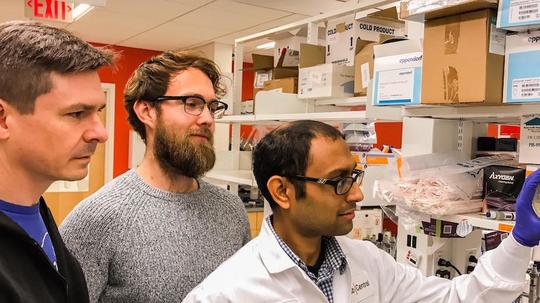
You may have heard of Asimov.
No, not Isaac "Pioneering Science Fiction Author" Asimov: Asimov the startup, a new, MIT-born biotech startup that raised a $4.7 million seed round led by top VC firm Andreessen Horowitz with the participation of Pillar, Data Collective and AME Cloud Ventures.
The company was founded in March 2017 by two Ph.D.s and a professor at MIT working in the field of biological engineering (respectively Alec Nielsen, Raja Srinivas and Christopher Voigt) as well as another professor at Boston University, Douglas Densmore. Currently, Asimov has seven employees - plus two starting in February - based in Lab Central in Cambridge, next to MIT.
On its website, Asimov said that it uses its in-house expertise to program "living cells with genetic circuits." Genetic circuits are the product that Asimov sells to biotechnology companies; before moving any further, we've asked CEO and co-founder Alec Nielsen what this means.
"Literally... every animal, every plant, every bacteria has genetic circuitry running inside of it that allows them to perform remarkable tasks," Nielsen explained. "In order to access the next generation of biotechnologies - things like intelligent therapeutics, or crops that can sense and respond to extreme weather conditions, or even just advanced molecular manufacturing - we need to be able to engineer genetic circuits."
Engineering genetic circuits present a unique set of challenges. It's not as simple as "inserting a gene into a cell," Nielsen said. It means working with multiple genes that interact with one another. "It's quite quantitative and quite tricky to get it right," Nielsen said.
In the past, biological engineers have tried to build genetic circuits in a very manual way, by trying different combinations until they found the right one. What Asimov does - thanks to a platform built in-house - is automating the design of genetic circuits, allowing companies to save time. Basically, scientists input the desired cell behavior and the software compiles it down until the DNA sequence that will return that behavior.
Well-engineered genetic circuits can lead to applications in every "material, whole food or drug that we get from nature," Nielsen said.
Nielsen declined to disclose the number of customers the company's currently working with, as well as pricing information for their products.








